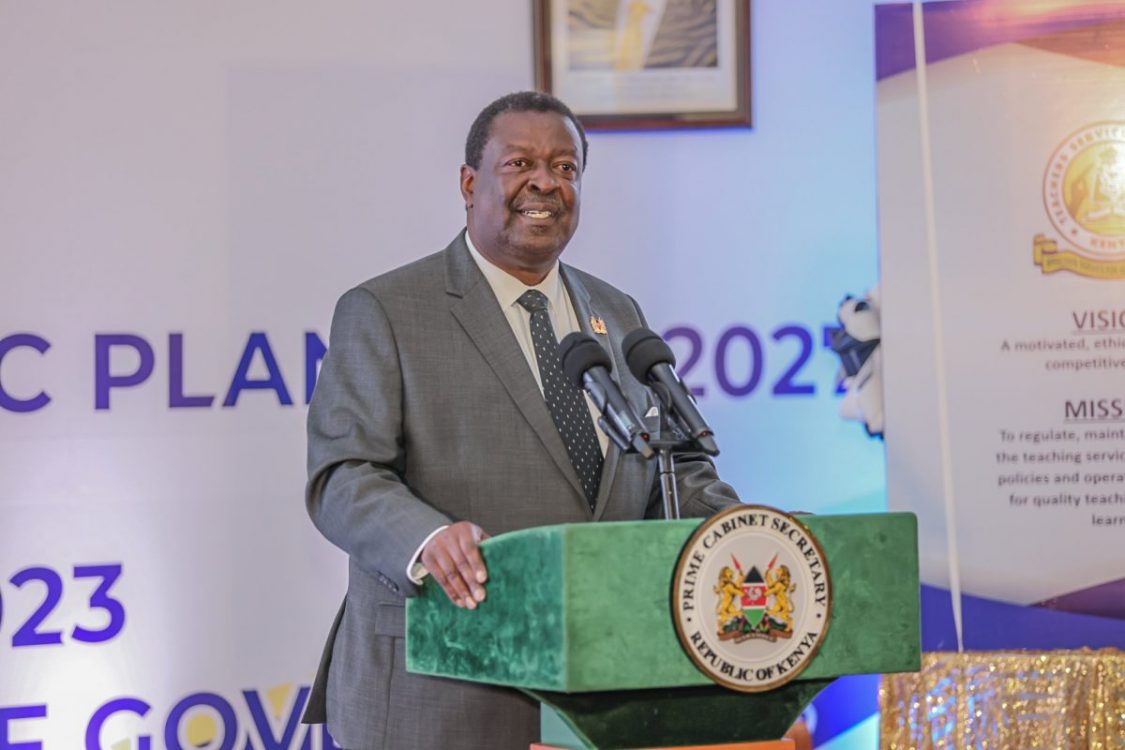Mudavadi calls for sobriety in education sector to avoid disruption of learning
By Irene.Githinji, July 6, 2023Prime Cabinet Secretary Musalia Mudavadi has called for sobriety in the education sector to avoid disruption of learning.
Mudavadi said on Thursday that whenever misunderstandings between stakeholders arise, parties involved must be willing to dialogue to sort out issues as opposed to allowing personal interests to take charge.
“I am addressing myself to the Teachers Service Commission (TSC) as I do to teachers and parents associations, students and those whose business is education. I am a strong believer that where there are misunderstandings, the power of reason must prevail,” Mudavadi said.
He made the remarks when he launched the TSC 2023-27 Strategic Plan at Kenya School of Government (KSG), which the Education Cabinet Secretary, Ezekiel Machogu, TSC Secretary Nancy Macharia and other education stakeholders attended.
“As you guard your personal interest, always know that there is an even greater civil interest that you owe society. Surely, disrupting the education of innocence when you could talk through an issue cannot be the reason for your existence. In other words, between education stakeholders, there should never be a moment when we refuse to talk with each other,” he urged.
Mudavadi said he is aware that there have been differences of opinion between TSC, teachers and parents over whether there has been effective teacher re-orientation on Competency-Based Curriculum (CBC) and the number of teachers required for its effective implementation.
He also stated that there has been a differing opinion from private sector owners of schools over the same implementation.
“Our journey to ensure inclusivity and equitable quality education and promote lifelong learning opportunities for all remains the focus of the Government. We do this for ourselves, but also as part of internationalizing our education outputs under the United Nation’s 2030 Agenda for Sustainable Development Goals (SDGs), specifically SDG 4,” he explained.
At the same time, Mudavadi said TSC’s issues with the Education Ministry on who should appoint school heads will soon be sorted out.
“Pending the report of the task force on CBC, nothing stops us from talking with each other, and feeding the task force with consensus position ideas. I believe that if you choose to criticise, do so while offering an alternative. Do not condemn. Have the candour to offer solutions,” he said.
Mudavadi stated that education is a critical enabler in providing the skills required in achieving the aspirations of the Bottom-Up Transformation Agenda (BETA).
To this end, he urged all education stakeholders to align themselves with these aspirations and commitment to spur increased efficiency in economic productivity.
And with a newly launched Strategic Plan, Mudavadi said that TSC should ensure capacity building and retooling of teachers to implement CBC and automation of processes for efficiency is successful.
Also of importance, he said, is whether recruitment of additional teachers has facilitated the 100 per cent transition and reduction of the teacher shortage as well as the delocalization exercise.
“I point out these issues because I am aware of competing stakeholder interests that suggest otherwise. If this is the case, how does TSC propose to overcome these handicaps given the harsh environment on financial resources? I, of course, note that you require Sh125.49 billion to implement the plan over a five-year period,” he noted.
Mudavadi on importance of strategic planning
He said the importance of strategic planning cannot be over-emphasised, noting that it is a deliberate organizational process that defines intended actions within a specified period.
“Gone are the days when strategic plans were viewed as mere accounting documents. They are now a measure of performance efficiency and effectiveness that must be taken seriously. The strength of a strategic plan lies in the agility to adjust and respond appropriately to emerging phenomena, both anticipated and opportunistic,” he affirmed.
He said government entities should know that in the next round of performance contracting review, strategic plans will be key measurement and grading instruments.
“Do not store your strategic plan thinking that its publication is the main goal,” he advised.
